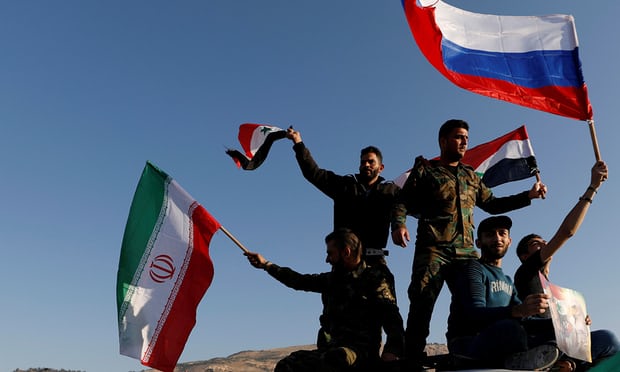Vladimir Putin has criticised the strikes launched by the US, UK and France as an “act of aggression”. But with a direct clash between Russia and the US unlikely, Moscow may look for other ways to strike back at the west, using Russia’s status as superpower spoiler to undermine key goals of US foreign policy.
There are a number of ways that Russia could cause problems for the US and its allies abroad by providing more advanced arms to Syria or helping North Korea flout sanctions, as well as heating up the Ukraine crisis, launching cyberattacks or upping support for rightwing populist politicians across Europe.
But Moscow may opt not to escalate, as it did not after the US cruise missile strike on the Shayrat airbase in 2017, recognising that the strikes were a one-off largely designed to send a political message and would not have a long-term impact on Assad’s prospects or the war in Syria.
That would leave the door open to another prize that analysts say Russia wants at the moment: a public summit between Putin and Donald Trump like the one the US president had proposed in a phone call last month, which could change, or at least marginally improve, the dynamic in Moscow’s favour.
From a simple point of view, Saturday’s missile strikes appear to be the latest escalation on Syria’s crowded battlefield, where a half-dozen countries and their proxies are jostling for influence and territory.
Moscow’s nominal response was to convene a UN security council session to condemn the strikes (its resolution failed to pass) and threaten to sell advanced Russian S-300 air defence systems to Syria and other countries, deterring interventions in Syria for states such as Israel.
Sanctions are another possibile response. Russian lawmakers are already proposing countermeasures to US sanctions earlier this month that targeted businessmen close to Putin and sent Russian stocks tumbling.
Russia may block access to its market for imports of food and drink or target companies such as Boeing by banning titanium exports. But Moscow lacks the economic heft to inflict equal pain through sanctions and some ideas proposed by lawmakers sound outlandish, like allowing Russian firms to pirate US products by ignoring intellectual property law.
Other possible responses include the use of cyber-weapons, which have increasingly played a role in the jousting between Russia and the west since 2014, with hackers cracking power grids and other key infrastructure, leaking sensitive political information and stealing private communications between government officials.
Earlier this year, the UK government publicly accused Russia of launching the 2017 NotPetya cyberattack that crippled key infrastructure and firms across Europe, including some hospitals in the UK.
The defence secretary, Gavin Williamson, accused Russia in February of “ripping up the rulebook”. “We have entered a new era of warfare, witnessing a destructive and deadly mix of conventional military might and malicious cyber-attacks,” he warned.
Through its proxies, Russia could also seek to put pressure on US troops who are fighting in Syria alongside opposition forces. But that could also put Russians at risk. Earlier this week, the CIA director Mike Pompeo told the Senate that US forces had killed “a couple hundred” Russian mercenaries in a shadowy clash that had taken place in February.
Despite the heated rhetoric, Saturday’s strike may paradoxically signal a de-escalation. There was a sense of relief in Moscow, and one of defiance in Syria, as it became clear that the strikes would be limited to three sites in Syria linked to chemical weapons production.
Seen in context, the attack concluded a tense public negotiation that allowed the US and other western countries to respond to the Assad regime’s use of chemical weapons without sparking an all-out war with Russia. After the strikes, all sides declared victory.
Analysts, some who serve Russia in advisory capacities, said this week that a direct military response from Moscow would be extremely unlikely unless Russia’s red line – a threat to its soldiers in Syria – were crossed. Russia could likely brush off the attack, they said, publicly complaining but privately staying its course in Syria that has seen the Assad regime brought back from near defeat.
A limited response could keep a meeting with Trump on the table, they said, and the US leader’s unpredictability meant that could provide a very attractive upside.
“We’ll buzz your ships,” one said of Moscow’s expected retaliation. “I don’t think we’re about to sink the USS Cook.”
The Guardian
More about: Assad
















































